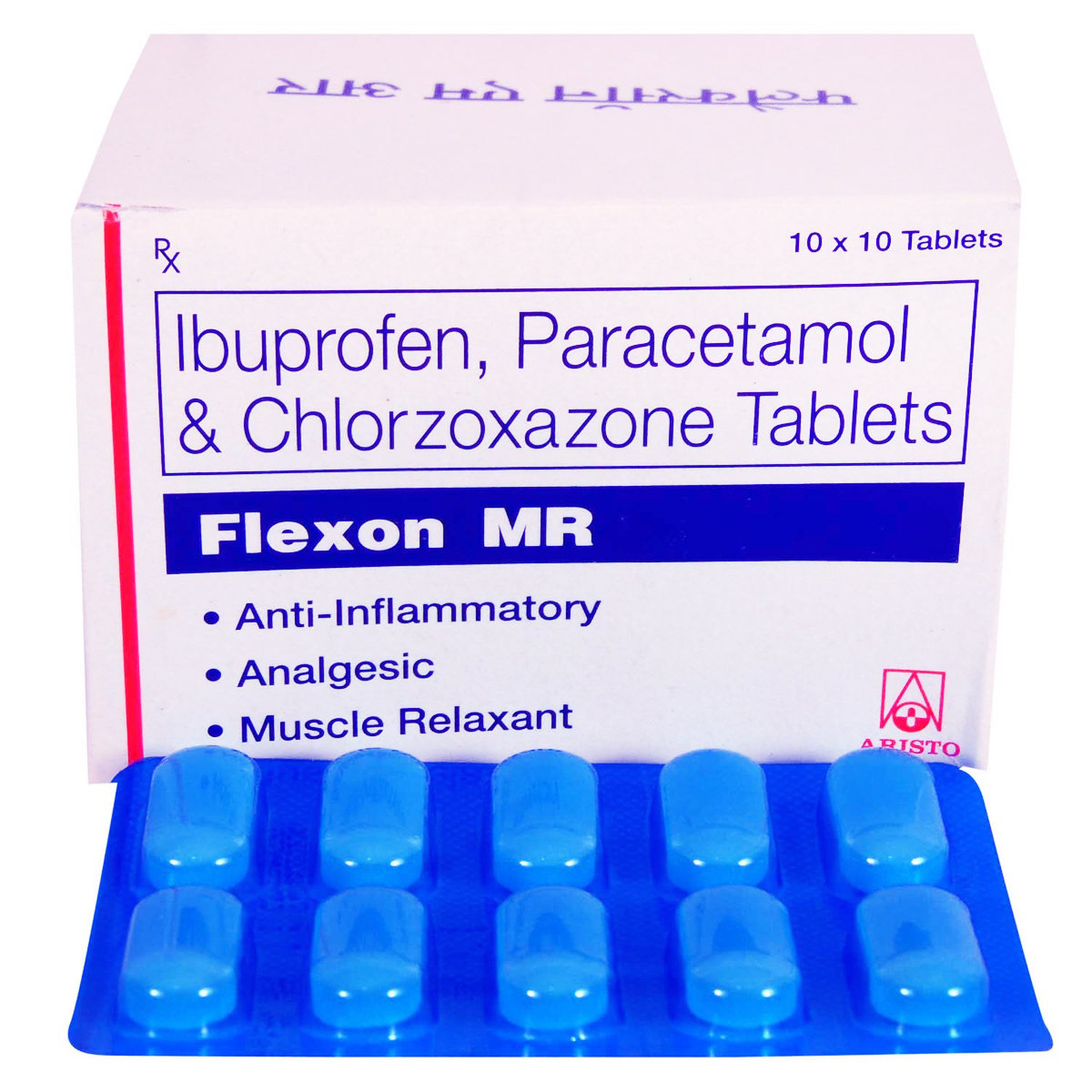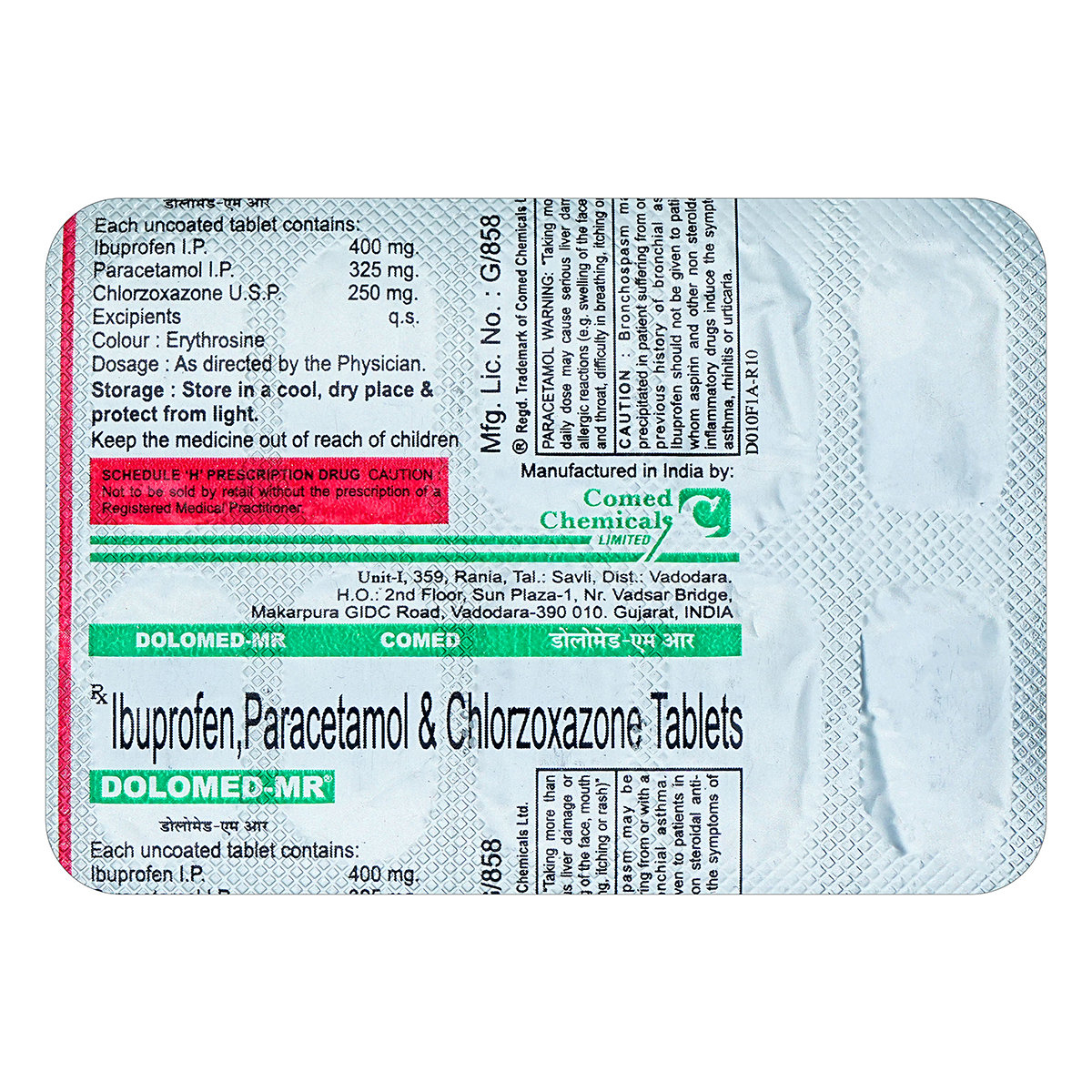Chlorzoxazone+ibuprofen+paracetamol
About Chlorzoxazone+ibuprofen+paracetamol
Chlorzoxazone+ibuprofen+paracetamol belongs to the class of drugs known as 'non-steroidal anti-inflammatory drug' (NSAID). Chlorzoxazone+ibuprofen+paracetamol is used in the reduction of musculoskeletal pain and muscle spasm due to tissue injury, resolution of post surgery inflammation and oedema (swollen tissue with fluid). Pain can be temporary (acute) or long term (chronic) in nature. Musculoskeletal pain can be caused due to soft tissues (muscle, tendon or ligaments) injury. Extreme tissue pain and inflammation caused due to sprains, strains or trauma or post-surgery may require a prolonged amount of time to heal.
Chlorzoxazone+ibuprofen+paracetamol contains Ibuprofen, Paracetamol and Chlorzoxazone. Ibuprofen is known to have an analgesic and anti-inflammatory effect for reducing mild to moderate pain. It works by blocking the effect of a chemical known as prostaglandin responsible for inducing pain and inflammation in our body. Paracetamol acts as a mild analgesic (mild pain reducer) and antipyretic (fever reducer) which enhances the pain relief action of Ibuprofen. Chlorzoxazone is a muscle relaxant, helps by blocking nerve impulses or pain sensations sent by the brain and causes relaxation of muscles.
Take Chlorzoxazone+ibuprofen+paracetamol as prescribed. Like all medicines, Chlorzoxazone+ibuprofen+paracetamol may cause side effects, although not everybody gets them. Nausea, indigestion, diarrhoea, drowsiness, dizziness, heartburn, stomach pain and restlessness are a few common side effects of Chlorzoxazone+ibuprofen+paracetamol.
Do not take Chlorzoxazone+ibuprofen+paracetamol if you are allergic to painkillers like aspirin, paracetamol, naproxen or diclofenac. It is not recommended for use in children, people with liver disease, heart disease or gastric ulcers/bleeding problems. Chlorzoxazone+ibuprofen+paracetamol may be associated with a small increase in the risk of heart attack (myocardial infarction). Avoid consumption of alcohol as it may damage your liver and cause even more side effects on taking this drug. Consult your doctor if your symptoms of pain, inflammation and fever do not disappear even after ten days.
Uses of Chlorzoxazone+ibuprofen+paracetamol
Medicinal Benefits
Chlorzoxazone+ibuprofen+paracetamol is composed of ibuprofen, chlorzoxazone and paracetamol primarily used to treat mild to moderate pain. Chlorzoxazone+ibuprofen+paracetamol plays a vital role in reducing pain and inflammation by blocking the release of chemical messengers which cause pain and fever. Chlorzoxazone+ibuprofen+paracetamol relieves pain and inflammation in arthritic conditions with benefit of increased antibiotic penetration and micro-circulation at the injury site. Ibuprofen works by blocking the effect of a chemical known as prostaglandin responsible for inducing pain and inflammation in our body. Paracetamol has the advantage of producing lesser gastric irritation compared to other painkillers like aspirin. So, it is well tolerated in mostly all age groups. Chlorzoxazone benefits in relaxing muscle to treat any type of musculoskeletal conditions like sprain, pain or injury. It is mainly prescribed for the sports related injury. Overall it relieve muscle spasm or stiffness of musculoskeletal joints thereby improving its movement.
Directions for Use
Storage
Side Effects of Chlorzoxazone+ibuprofen+paracetamol
- Nausea
- Indigestion
- Diarrhoea
- Drowsiness
- Dizziness
- Heartburn
- Stomach pain
- Restlessness
Drug Warnings
Chlorzoxazone+ibuprofen+paracetamol should be taken with caution if you have an active stomach ulcer, recent gastrointestinal bleeding, asthma, recent by-pass heart surgery, heart disease or history of allergy to any painkillers or analgesic. Avoid driving while consuming Chlorzoxazone+ibuprofen+paracetamol as it can cause dizziness in some individuals and hamper your focus and reflexes. Avoid concomitant consumption of drugs containing the same chemicals as Chlorzoxazone+ibuprofen+paracetamol as it can lead to overdosage and unwanted side effects. Immediately consult your doctor in case of persistent side effects like stomach pain on consumption of Chlorzoxazone+ibuprofen+paracetamol. Avoid consuming alcohol while you are on Chlorzoxazone+ibuprofen+paracetamol.
Drug Interactions
Drug-Drug Interaction: Chlorzoxazone+ibuprofen+paracetamol is shown to interact with various drugs. Some of them include pain killers (naproxen, aspirin, ibuprofen, tramadol, hydrocodone, oxycodone), lithium, anticancer/antimetabolites (methotrexate), blood thinner or anticoagulant (warfarin, coumadin, jantoven), blood pressure or heart medicine, nausea medicine (metoclopramide, domperidone), diuretic/water pills (thiazides, furosemide), a steroid medicine (prednisone), quinolones antibiotics (ciprofloxacin), respiratory medicines (theophyllines, ephedrine), cholesterol-reducing medicine (colestyramine) and antidepressants (duloxetine). These drugs may affect the working of Chlorzoxazone+ibuprofen+paracetamol and may alter its efficacy.
Drug-Food Interaction: Excessive intake of caffeine-containing food or drinks like coffee, tea, chocolate and some fizzy drinks should be avoided while taking Chlorzoxazone+ibuprofen+paracetamol. Taking them together may lead to drowsiness and dizziness and sleepiness. And also, consuming alcohol along with Chlorzoxazone+ibuprofen+paracetamol can cause excessive ingestion of alcohol and potentiate liver damage action of paracetamol.
Drug-Disease Interaction: Chlorzoxazone+ibuprofen+paracetamol should not recommend for people having bleeding disorders, like haemophilia, von Willebrand disease or low blood platelets. Besides this, it should not be given to children suffering from influenza (flu) or chickenpox. It should also be avoided in case of the presence of gastric or duodenal ulcers.
Drug-Drug Interactions Checker List:
Safety Advice

Alcohol
cautionTaking Chlorzoxazone+ibuprofen+paracetamol with alcohol may cause dizziness or drowsiness. Besides this, it can also damage your liver if taken for a longer duration. So, avoid or limit intake of alcoholic beverages with Chlorzoxazone+ibuprofen+paracetamol.

Pregnancy
unsafeUse of Chlorzoxazone+ibuprofen+paracetamol during pregnancy is not recommended as taking this medicine during the last 3 months of pregnancy may harm the unborn baby.

Breast Feeding
cautionTake Chlorzoxazone+ibuprofen+paracetamol only if prescribed by your doctor.

Driving
unsafeAfter taking Chlorzoxazone+ibuprofen+paracetamol you may notice dizziness, sleepiness, drowsiness or fatigue as it contain paracetamol which causes sedation. So, in this you should stop taking Chlorzoxazone+ibuprofen+paracetamol and contact your doctor.

Liver
cautionChlorzoxazone+ibuprofen+paracetamol to be taken with caution, especially if you have a history of liver disease. Dose may have to be adjusted by your doctor.

Kidney
cautionChlorzoxazone+ibuprofen+paracetamol to be taken with caution, especially if you have a history of Kidney diseases/conditions. Dose may have to be adjusted by your doctor.

Children
cautionChlorzoxazone+ibuprofen+paracetamol is contraindicated in children below 20 kg body weight or younger than 6 years of age. It may cause kidney problems in children and adolescents who are dehydrated. It should be use only when prescribed by a child specialist.
Habit Forming
Diet & Lifestyle Advise
- Include more glucosamine, chondroitin sulphate, vitamin D, calcium enriched supplements. Besides this, turmeric and fish oils can help in reducing inflammation in the tissue.
- Do not go for heavy exercise as it may increase your joint pain in arthritis. Instead, you can do stretching, low impact aerobic exercise like walking on treadmill, bike riding and swimming. You can also strengthen your muscles by lifting light weights.
- In chronic condition of arthritis or joint pain try to include fish like salmon, trout, tuna and sardines. These fishes are enriched with omega-3 fatty acids that minimize level of chemical called cytokines, which ramp up inflammation.
- Your sitting posture is important especially when you have pain and inflammation. Try to sit as little as possible and only for a short duration of time. Long term immobility is harmful in conditions like arthritis. Use back support like a rolled up towel at the back of your spine curve to minimize pain. Keep your knees and hips at a right angle. Besides this, you can also use a foot rest if required.
Special Advise
Stop using Chlorzoxazone+ibuprofen+paracetamol and consult your doctor immediately if you are having bleeding from the rectum (back passage), have black sticky bowel motions (stools) or bloody diarrhoea.
Patients Concern
Disease/Condition Glossary
Pain can be temporary (acute) or long-term (chronic) in nature. Musculoskeletal pain can be caused due to soft tissue (muscle, tendon or ligaments) injury. Extreme tissue pain and inflammation caused due to sprains, strains or trauma or post-surgery may require a prolonged amount of time to heal.
FAQs
Yes, Chlorzoxazone+ibuprofen+paracetamol is known to cause dizziness. If you feel dizzy, please take rest and also avoid driving while you take Chlorzoxazone+ibuprofen+paracetamol as it can be harmful.
Chlorzoxazone+ibuprofen+paracetamol when taken by patients who are allergic to pain-killers or NSAIDs can be harmful. It should also be avoided in person with history of heart failure, kidney or liver disease, stomach ulcers and high blood pressure.
Yes. But ensure pain killers or any other drugs you are taking does not contain paracetamol, aceclofenac or chlorzoxazone. As, it may lead to overdosage leading to unpleasant side effects.
Taking excessive alcohol with Chlorzoxazone+ibuprofen+paracetamol can cause liver damage. So, it is advisable to avoid or limit intake of alcohol during the treatment with Chlorzoxazone+ibuprofen+paracetamol.
It depends on whether your cough and cold pills contain ibuprofen, chlorzoxazone and paracetamol or not. If it contains these two medicines, do not take it. It may lead to overdosage, thereby producing unpleasant side effects. Consult your doctor before taking it in such cases.
Chlorzoxazone+ibuprofen+paracetamol is known to be contra-indicated in patients allergic to painkillers (NSAIDs) or any of the components or excipients of this medicine. Its use should also be avoided in patients with history of heart failure, high blood pressure, stomach ulcer and kidney/liver disease.




